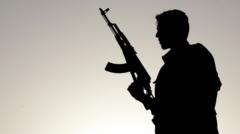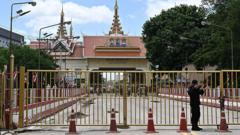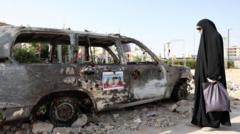As hostilities peak and nationalist sentiments rise, the risk of further military escalation between India and Pakistan looms large, prompting international voices urging diplomatic efforts to restore peace.
**Can Tensions Between India and Pakistan Be Eased?**

**Can Tensions Between India and Pakistan Be Eased?**
Calls for calm rise globally amid escalating India-Pakistan conflict.
As the long-standing crisis between India and Pakistan intensifies, global leaders are increasingly calling for restraint. Following India’s recent airstrikes and Pakistan's claims of downing Indian aircraft—claims that India has not verified—the prevailing hope was both nations could declare a "victory" and step back from the brink. However, a continuous cycle of retaliatory attacks threatens to spiral into a more severe conflict.
In past confrontations, such as those in 2019 and 2016, international powers, notably the United States, took the initiative to mediate and convince both nations to de-escalate. However, this time around, voices from the international community have been notably absent. Ayesha Siddiqa, a Pakistani analyst at King’s College London, warns of the dangers of this silence, emphasizing that this situation is unprecedented in its lack of active monitoring by major powers.
Without intervention from the U.S., the potential for ongoing disputes remains high. While U.S. Secretary of State Marco Rubio has encouraged leaders from both nations to ease tensions, Vice President JD Vance noted in a recent interview that the U.S. would refrain from intervening should the issue escalate into war. Past confrontations, like the 2019 event where India conducted "surgical strikes," were swiftly calmed through international diplomacy, including U.S. intervention that ultimately freed a detained Indian pilot.
As the power dynamics shift, China also plays a crucial role due to its close ties with Pakistan, highlighted by significant economic investments. Meanwhile, incidents from years past signal that international bodies need to act; experts believe it is incumbent upon the UN Security Council's permanent members to investigate the conflict's dynamics, especially regarding accusations of Pakistani support for insurgents in Kashmir.
Efforts for mediation could also come from Gulf states such as Saudi Arabia, which has historically maintained rapport with both countries. Recent visits from Saudi diplomats indicate potential openings for dialogue amid surging tensions.
A possible resolution might emerge where both nations can claim some form of victory to pacify domestic sentiments. India is asserting that its military responses are justified in accountability for recent attacks, while Pakistan’s military seeks to demonstrate its capability to retaliate. However, the stakes are high, and with changing objectives on both sides, the outcome remains uncertain.
Ultimately, experts like Siddiqa underscore that effective resolution will hinge on India’s clarity of purpose, highlighting that fluctuating goals could dictate the future trajectory of the crisis.
In past confrontations, such as those in 2019 and 2016, international powers, notably the United States, took the initiative to mediate and convince both nations to de-escalate. However, this time around, voices from the international community have been notably absent. Ayesha Siddiqa, a Pakistani analyst at King’s College London, warns of the dangers of this silence, emphasizing that this situation is unprecedented in its lack of active monitoring by major powers.
Without intervention from the U.S., the potential for ongoing disputes remains high. While U.S. Secretary of State Marco Rubio has encouraged leaders from both nations to ease tensions, Vice President JD Vance noted in a recent interview that the U.S. would refrain from intervening should the issue escalate into war. Past confrontations, like the 2019 event where India conducted "surgical strikes," were swiftly calmed through international diplomacy, including U.S. intervention that ultimately freed a detained Indian pilot.
As the power dynamics shift, China also plays a crucial role due to its close ties with Pakistan, highlighted by significant economic investments. Meanwhile, incidents from years past signal that international bodies need to act; experts believe it is incumbent upon the UN Security Council's permanent members to investigate the conflict's dynamics, especially regarding accusations of Pakistani support for insurgents in Kashmir.
Efforts for mediation could also come from Gulf states such as Saudi Arabia, which has historically maintained rapport with both countries. Recent visits from Saudi diplomats indicate potential openings for dialogue amid surging tensions.
A possible resolution might emerge where both nations can claim some form of victory to pacify domestic sentiments. India is asserting that its military responses are justified in accountability for recent attacks, while Pakistan’s military seeks to demonstrate its capability to retaliate. However, the stakes are high, and with changing objectives on both sides, the outcome remains uncertain.
Ultimately, experts like Siddiqa underscore that effective resolution will hinge on India’s clarity of purpose, highlighting that fluctuating goals could dictate the future trajectory of the crisis.






















